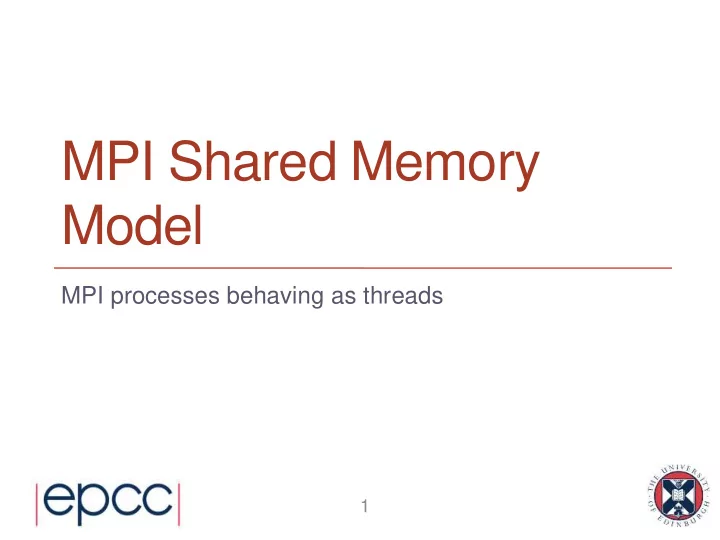

MPI Shared Memory Model MPI processes behaving as threads 1
Overview • Motivation • Node-local communicators • Shared window allocation • Synchronisation 2
MPI + OpenMP • In OMP parallel regions, all threads access shared arrays - why can’t we do this with MPI processes? MPI MPI + OpenMP P P P P P P P P P P P P 3
Exploiting Shared Memory • With standard RMA - publish local memory in a collective shared window - can do read and write with MPI_Get / MPI_Put - (plus appropriate synchronisatio • Seems wasteful on a node - why can’t we just read and write directly as in OpenMP? • Requirement - technically requires the Unified model • where there is no distinction between RMA and local memory - can check this callng MPI_Win_get_attr with MPI_WIN_MODEL • model should be MPI_WIN_UNIFIED - this is not a restriction in practice for standard CPU architectures 4
Procedure • Processes join separate communicators for each node • Shared array allocation across all processes on a node - OS can arrange for it to be a single global array • Access memory by indexing outside limits of local array - e.g. localarray[-1] will be last entry on the previous process • Need appropriate synchronisation for local accesses • Still need MPI calls for internode communication - e.g. standard send and receive 5
Splitting the communicator int MPI_Comm_split_type(MPI_Comm comm, int split_type, int key, MPI_Info info, MPI_Comm *newcomm) MPI_COMM_SPLIT_TYPE(COMM, SPLIT_TYPE, KEY, INFO, NEWCOMM, IERROR) INTEGER COMM, SPLIT_TYPE, KEY, INFO, NEWCOMM, IERROR • comm: parent communicator, e.g. MPI_COMM_WORLD • split_type: MPI_COMM_NODE • key: controls rank ordering within sub-communicator • info: can just use default: MPI_INFO_NULL 6
Example MPI_Comm_split_type(MPI_COMM_WORLD, MPI_COMM_TYPE_SHARED, rank, MPI_INFO_NULL, &nodecomm); COMM_WORLD size = 12 rank 0 1 2 3 4 5 6 7 8 9 10 11 P P P P P P P P P P P P 0 1 2 3 4 5 0 1 2 3 4 5 rank rank size = 6 size = 6 nodecomm nodecomm 7
Allocating the array int MPI_Win_allocate_shared (MPI_Aint size, int disp_unit, MPI_Info info, MPI_Comm comm, void *baseptr, MPI_Win *win) MPI_WIN_ALLOCATE_SHARED(SIZE, DISP_UNIT, INFO, COMM, BASEPTR, WIN, IERROR) INTEGER(KIND=MPI_ADDRESS_KIND) SIZE, BASEPTR INTEGER DISP_UNIT, INFO, COMM, WIN, IERROR • size: window size in bytes • disp_unit: basic counting unit in bytes, e.g. sizeof(int) • info: can just use default: MPI_INFO_NULL • comm: parent comm (must be within a single node) • baseptr: allocated storage • win: allocated window 8
Traffic Model Example MPI_Comm nodecomm; int *oldroad; MPI_Win nodewin; MPI_Aint winsize; int displ_unit; winsize = (nlocal+2)*sizeof(int); // displacements counted in units of integers disp_unit = sizeof(int); MPI_Win_allocate_shared(winsize, disp_unit, MPI_INFO_NULL, nodecomm, &oldroad, &nodewin); 9
Shared Array with winsize = 4 x[3] x[0] x[0] x[3] x[-1] x[4] x[7] noderank 0 noderank 1 noderank 2 10
Synchronisation • Can do halo swapping by direct copies - need to ensure data is ready beforehand and available afterwards - requires synchronisation, e.g.. MPI_Win_fence - takes hints – can just set to default of 0 • Entirely analogous to OpenMP - bracket remote accesses with omp_barrier or begin / end parallel MPI_Win_fence(0, nodecomm); oldroad[nlocal+2] = oldroad[nlocal] oldroad[-1] = oldroad[0]; MPI_Win_fence(0, nodecomm); 11
Off-node comms • Direct read / write only works within node • Still need MPI calls for inter-node - e.g. noderank = 0 and noderank = nodesize-1 call MPI_Send / Recv - could actually use any rank to do this ... • This must take place in MPI_COMM_WORLD 12
Conclusion • Relatively simple syntax for shared memory in MPI - much better than roll-you-own solutions • Possible use cases - on-node computations without needing MPI - one copy of static data per node (not per process) • Advantages - an incremental “plug and play” approach unlike MPI + OpenMP • Disadvantages - no automatic support for splitting up parallel loops - global array may have halo data sprinkled inside - may not help in some memory-limited cases 13
Recommend
More recommend